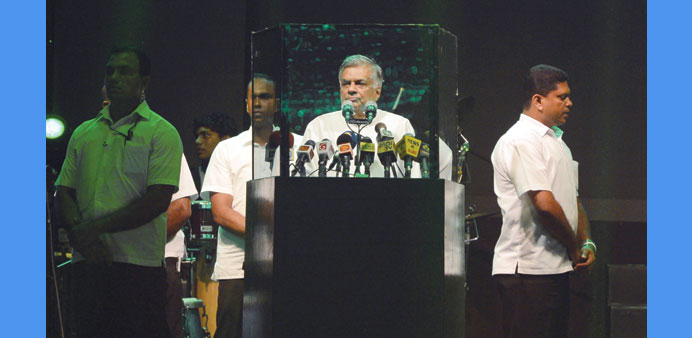Ranil Wickremesinghe delivers a speech to supporters in Colombo last week during campaigning.
Agencies/Colombo
Sri Lanka’s Prime Minister Ranil Wickremesinghe was poised to form a new broad-based unity government yesterday with the backing of followers of president Maithripala Sirisena after winning parliamentary elections.
Wickremesinghe’s United National Party (UNP) fell seven seats short of an absolute majority in the 225-member legislature in Monday’s election when he saw off a challenge by the island’s former president Mahinda Rajapakse.
Rajapakse had been standing as a candidate of the United People’s Freedom Alliance (UPFA) which is officially led by Sirisena, even though the two men are now arch rivals.
While Rajapakse and a rump of his hard-core supporters are expected to remain on the opposition benches, another faction loyal to Sirisena is going to link up with the UNP, according to one of its leaders.
“We will support the formation of a national government, at least for a period of two years,” Duminda Dissanayake told reporters after meeting Sirisena in Colombo.
Officials said Wickremesinghe was expected to be sworn in by the president at his sea-front office today morning and his new cabinet could include some of the defectors.
The break-up of the UPFA had been widely expected given the splits between the factions loyal to Sirisena and Rajapakse who surprisingly lost a January presidential election after nearly a decade in power.
Sirisena had been an ally of Rajapakse, serving as health minister before splitting from his mentor and running against him for the presidency.
After winning the contest in January, Sirisena then turned to Wickremesinghe’s UNP to lead a minority government.
But after its programme was consistently blocked in parliament where Rajapakse’s followers remained in the ascendant, Sirisena decided to call elections a year ahead of schedule to break the logjam.
How many of the 95 UPFA members who won seats will join the government is not yet known. Rajapakse has indicated that he does not want to be the formal opposition leader but will instead be a backbencher.
Sirisena wants to reverse many of the constitutional changes brought in by Rajapakse which gave huge powers to the president.
Wickremesinghe’s government is likely to introduce legislation to establish independent commissions to run the police, public service and judiciary.
Sri Lanka’s prime minister-elect Ranil Wickremesinghe is a champion of free enterprise who has managed to win economic and political support from both the West and neigbour India in his eight months in office.
The veteran politician could be more powerful this time around, with Sirisena promising to return the Indian Ocean nation to a parliamentary democracy.
Under reforms pledged in January, Sirisena wants to transfer many of the president’s executive powers, amassed by Rajapakse during his decade-long rule, back to the premier.
Wickremesinghe, a nephew of Sri Lanka’s first executive president, Junius Jayewardene, almost became a reporter.
But a government takeover of his family’s newspaper in 1973 deprived him of a journalism career and he went into politics instead.
He rose to be prime minister in May 1993, when a suicide bomber assassinated president Ranasinghe Premadasa.
A similar incident arguably cost him the presidency in December 1999 when Chandrika Kumaratunga, the daughter of the country’s well-known Bandaranaike dynasty, was wounded in a suicide bomb attack.
The attackers struck just three days before the presidential election and Kumaratunga went on to win narrowly on a wave of sympathy.
Wickremesinghe got his second chance in 2002, when he was credited with pulling the country out of its first ever recession and boosting economic growth to 4.0 percent. In his campaign for a fourth term in office, he has pledged to overhaul Sri Lanka’s dismal human rights record and create a “brand new country in 60 months”.
Sri Lanka came in for strong criticism over its rights record under Rajapakse, who resisted UN calls to investigate allegations that at least 40,000 Tamil civilians were killed by government forces in 2009 during the final stages of the decades-long war against Tamil separatist guerrillas.

